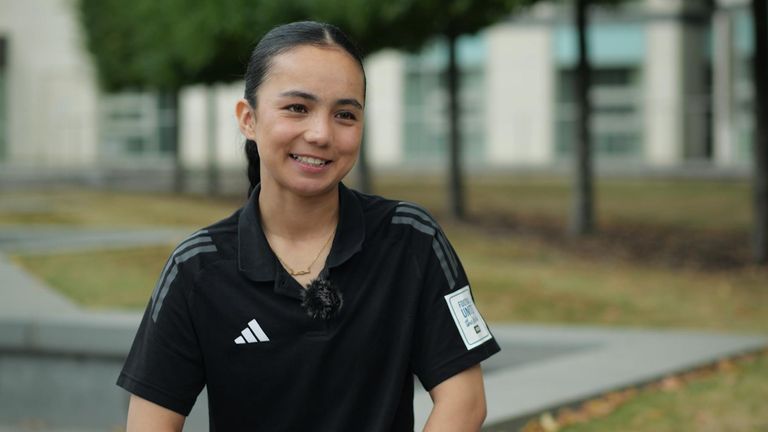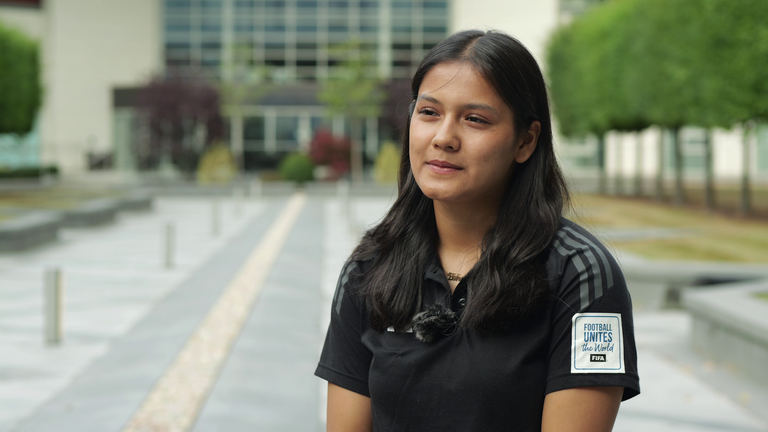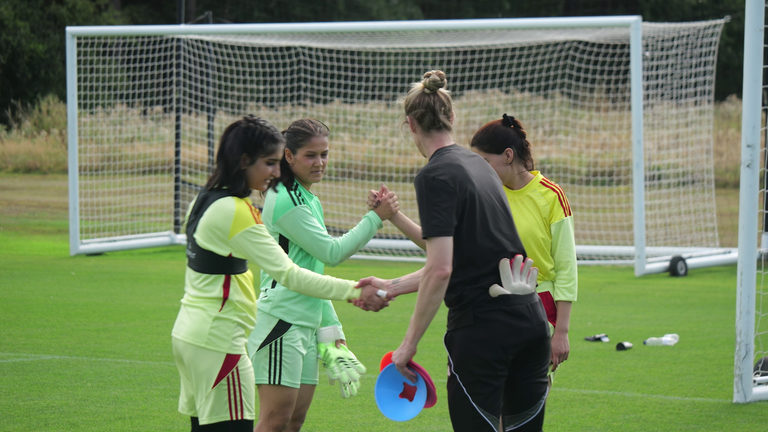Far from home – at the St George’s Park home of the Lionesses – female footballers from Afghanistan have been reunited.
Finally, they are playing together again. Here on a mission to win places on the Afghan refugee team, uniquely established by FIFA.
“It was like a warm hug for every single one of us,” defender Najma Arefi told Sky News. “Being here together and working as a team.
“And we want to share with the world that we are still here and are still fighting.”
‘A dog on the street has more rights’
But away from the pitch, they reflect why they are here, of everything lost when the Taliban rapidly regained power in August 2021.
“Everything collapsed overnight, and it was like a nightmare,” Arefi said. “Some of my friends back home, they’re saying a dog on the street has more rights than a woman.”
Like Arefi, goalkeeper Elaha Safdari ended up in Doncaster after fleeing as a 17-year-old without her family. The only memento from home – her goalkeeper of the year trophy from the Afghan championship.
But discrimination was felt where she once found so much joy – football – as she searched for a club in England.
“I felt racism, they attacked me,” she said. “I’m a refugee, I accept that, but I’m here.
“I had to start from zero and I’m just a human who had to leave a country just to stay alive.”
But Safdari never gave up on football. It inspired her through education here.
Just as campaigners never gave up on Afghanistan once again having a women’s football team.
The first official match was in 2010, with sport symbolising the empowerment of women in a new Afghanistan.
Youth teams were still playing in 2021 until the Islamic fundamentalists seized control after Afghanistan was abandoned by the Western nations that originally toppled the oppressive regime in 2001.
The following day, former captain Khalida Popal told me of distressing calls she was receiving from players fearing for their safety.
Evacuations were the priority. Then came the dream of seeing a national team in exile restored. It has been challenging and slow amid the wider erosion of women’s rights.
‘We just want FIFA to recognise us’
But players credit Popal with keeping the pressure on world football’s governing body, which has taken the unprecedented decision to organise matches for a refugee team in exile later this year.
“It’s a great step from FIFA,” Safdari said. “We just want to ask FIFA to recognise us.”
They want to continue playing beyond the friendlies. Not under the refugee team banner but as the official women’s national team again. And not playing under the Taliban flag.
“We’ve missed so many years,” Safdari said. “I don’t even want to miss another second. I’m just ready, I’m eager and I’m hungry to play.”
Football – like international cricket – has allowed Afghanistan to only field a men’s team.
“It’s just so ridiculous when men are playing… representing the country,” Safdari said. “But women cannot”.
FIFA is hoping to exert pressure diplomatically on the Taliban to restore women’s rights, but no progress seems to have been made in four years.
And that brings us to this training camp in Staffordshire, with FIFA bringing in Scottish manager Pauline Hamill to find 23 players to form a squad. It follows a previous talent identification camp in Australia.
‘I could feel her pain’
It’s no regular squad selection for Scotland’s most-capped player, who has since coached Scottish and Saudi youth teams.
“You’re very sensitive to some of the situations that the players have been through,” Hamill said.
“One of the players opened up to me in one of the camps and… I just could feel her pain.
“I think as a coach, people see you on the pitch and you’re working technically and tactically with the players.
“But having these moments off the pitch, it’s sometimes nothing can prepare you for.”
Read more from Sky News:
Lionesses celebrate Euros win
Women’s World Cup to be expanded
Afghan women target cricket body
And for the players, this is about a bigger mission, beyond football, never forgetting the sisters back home with little freedom.
“I’m still thinking that it’s just a dream to be here,” Arefi said.
“We are going to wake up and Afghanistan is free. But it is something that we need to accept… and to speak for so many women and girls that have been silenced in the country and to be their voice and to represent the world.
“Don’t forget Afghan women that are there, going through hard times.”
This story originally appeared on Skynews








